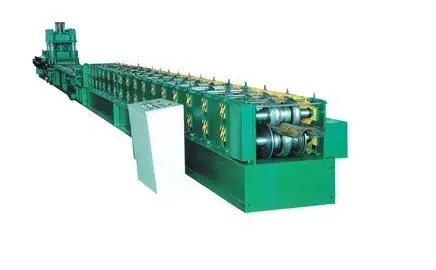
Understanding C Channel Forming Machines An Essential Tool in Metal Fabrication
In the realm of metal fabrication, the C channel forming machine stands out as a critical piece of machinery for producing consistent, high-quality components used in various construction and manufacturing applications. These machines are adept at transforming flat metal sheets into C-shaped channels, which are commonly used in framing, shelving, and structural support. This article delves into the functionality, advantages, and applications of C channel forming machines, providing insights into their role in modern industry.
Functionality of C Channel Forming Machines
C channel forming machines operate through a series of processes that transform a flat metal strip into a C-shaped channel. The typical workflow involves several stages feeding, roll forming, cutting, and sometimes punching or bending.
1. Feeding The process begins with feeding a pre-cut metal strip into the machine. This strip is usually made of steel, aluminum, or various alloys, depending on the intended application.
2. Roll Forming Once the strip is fed into the machine, it passes through a series of rollers that gradually shape the metal into a C profile. Each roller is configured to bend the metal slightly more than the previous one, allowing for precise shaping without compromising the integrity of the material.
3. Cutting After the desired shape has been formed, the next step involves cutting the C channel to the required length. This is often achieved through automated cutting systems that ensure clean and accurate cuts, reducing material waste.
4. Additional Features Many modern C channel forming machines come equipped with additional functionalities, such as punching holes for bolting or bending sections for added strength and versatility.
Advantages of C Channel Forming Machines
C channel forming machines offer numerous advantages that enhance manufacturing efficiency and product quality
1. Precision and Consistency Automated forming processes ensure that every channel produced meets exact specifications, reducing variances that could occur with manual processes. This consistency is vital for applications in construction and industrial settings, where structural integrity is paramount.

2. Versatility These machines can often be adjusted to produce various sizes and thicknesses of C channels, making them suitable for a wide range of projects. Many machines are also capable of switching between different profiles quickly, adapting to changing production needs.
3. Efficiency C channel forming machines streamline production by minimizing manual labor and reducing production times. Their automation allows for continuous operation, which is essential for high-demand manufacturing environments.
4. Cost-Effectiveness While the initial investment in a C channel forming machine can be significant, the long-term savings due to reduced labor costs, minimized material waste, and increased production speed make them a sound investment for many businesses.
Applications of C Channel Forming Machines
C channel shapes are incredibly versatile and find applications across various industries, including
1. Construction C channels serve as structural supports in buildings, offering strength and stability without adding excessive weight.
2. Manufacturing In manufacturing settings, C channels create frames for machines, shelving units, and conveyor systems, providing robust frameworks that can withstand heavy loads.
3. Automotive and Aerospace In sectors where weight and strength are critical, C channel profiles are used in the construction of vehicle frames and aircraft components, maximizing durability while minimizing excess material.
4. HVAC and Electrical C channels are often utilized in the installation of HVAC systems and electrical conduits, providing support for ducts and wiring.
Conclusion
C channel forming machines play an indispensable role in the metal fabrication industry, delivering precision, efficiency, and versatility. Their ability to produce high-quality C-shaped channels makes them essential for a myriad of applications, from construction to manufacturing. As industry demands evolve, the technology behind C channel forming machines continues to advance, promising even greater efficiencies and capabilities for future manufacturing processes. For businesses looking to enhance their production capabilities and maintain a competitive edge, investing in a C channel forming machine represents a step into a more efficient and productive manufacturing landscape.